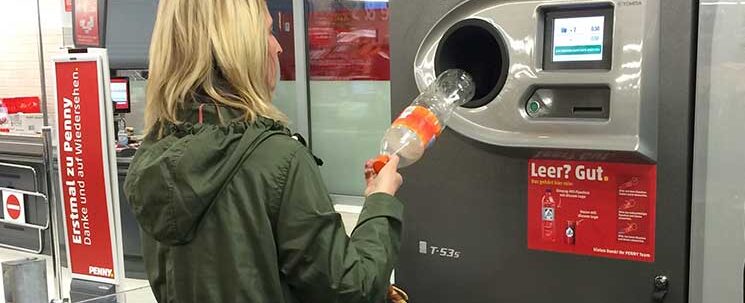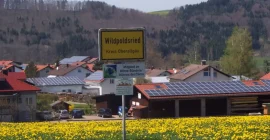A walk through the streets, public parks and natural spaces of Spain guarantees that we will come across abandoned bottles and cans. In Germany this no longer happens, and it is not because of the greater civic sense of the citizens of this country (or not only because of that), but because there the recycling of bottles and cans has a monetary incentive.
Some four decades ago, in Spain it was common to return to the grocery store with a bag full of glass bottles brought from home: they were the “cascos”, the empty bottles that later generated a discount when buying new ones.
These bottles were sent to the bottlers, which washed and reused them. The system disappeared with the entry of plastic bottles and recycling containers. But does it still make sense to return the bottles? The Germans think so.
In Germany, a deposit system known as “Pfand” has existed since 2003 for beverage containers made of glass, plastic or aluminum cans. Consumers pay an additional fee (typically around 25 cents) when purchasing a bottle or can, which is refunded when the empty container is returned to a recycling machine, typically located at the entrance of a supermarket or other participating location.
The machines sort the materials and issue a voucher for the deposit, which can be exchanged for cash or used to purchase other items. The deposit fee and return system for packaging serve as an incentive for consumers to recycle, reduce waste and litter, and conserve resources.
Initially it only applied to thick plastic bottles and cans, but with the reform of the standard in 2022 all bottles, including light plastic ones, also fall under it.
This deposit, return, return (SDDR) system is the modern version of “bring your helmets to the store”. The Germans are not the only ones. A similar system is in force in Austria, Sweden, Denmark, Finland and the Netherlands.
In Rome, its inhabitants get five cents off when buying metro tickets for each plastic bottle recycled. In Argentina they maintain the same system that existed in Spain: a discount on the price of the drink if you bring an empty bottle.
The resistance against the SDDR in Spain
The Valencian Community became a battlefield between industry, government and environmental organizations in 2016 when it announced the reimplantation of the deposit system in 2016.
From the beginning, the Government of the Community faced Ecoembes (Ecoembalajes España S.A.), a private organization made up of 12,000 companies, including large distributors such as Mercadona, Coca Cola or Carrefour, which has a monopoly on recycling in Spanish territory ( the container system) through a concession.
The companies pay Ecoembes for each container they put in the shops. Ecoembes, in turn, pays the municipalities, which are in charge of processing the containers.
Ecoembes then collects the packaging from the yellow bins, but only pays for those that are suitable for recycling. As it has already been paid, it also benefits from packaging that is never recycled, which is 60% of the total according to the latest figures.
In light of this, it could be thought that a system like the SDDR, where bottles have a small premium that consumers later recover independently, is against the interests of Ecoembes, which together with can manufacturers has opposed the program in the Valencian Community, Navarra and Catalonia.
Their arguments are that the SDDR system is more expensive and does not have significant environmental benefits, since it would not increase the recycling rate, and it would also make prices more expensive for consumers.
In Valencia the contest has ended in an agreement with Ecoembes, which has installed and manages four machines where the consumer gets one cent per recycled container.
Doesn’t seem like much of an incentive. In Navarra, the Foral Waste Law approved in 2018 includes the SDDR, but its fruits are yet to be seen, while in Catalonia the battle continues.
SDDR results
In Germany, the deposit system was also opposed by industry, which took the Federal Government to court, but they ended up losing in every case. Two decades later, the results speak for themselves.
Before 2003, an estimated 3 billion disposable beverage containers were dumped into the environment in Germany each year, according to the NGO Environmental Action Germany (DUH).
Today, the country boasts a 98.5% rate of return. Part of the success is due to the emergence of a parallel economy of low-income people who hunt for abandoned bottles and cans to make money.
The success has been repeated in other countries: in Denmark, 99.5% of soft drink and beer bottles and 99% of reusable PET containers are recovered. In the Netherlands, 98% of glass and 99% of PET are returned, while in Norway 98% of beer and soft drink bottles are returned.
There are other advantages. For example, PET containers recycled in deposit return machines can be reused to a greater extent for food, since they are not contaminated with other waste.
However, a design flaw in the incentives in Germany has had unintended consequences on the beverage market. Single-use bottles have a higher deposit (25 cents) than reusable ones (8 and 10 cents).
Over the years, the bottling companies have received a “bonus pay” of about 3,000 million in containers that were not recycled, and for those who did not have to return the deposit, which were bagged.
In this way, they have had a greater incentive to bottle in single-use containers, to the detriment of reusable ones, such as glass, which went from 80% to 50% on supermarket shelves. The new regulation intends to impose a minimum of reusable containers to attack this problem.
Could it work in Spain?
We Spaniards use 18,000 million containers a year, and at least half of them end up dirtying our environment or burning in landfills.
At the same time, there is no incentive to put packaging in the yellow bins other than good ecological conscience. It is enough to walk through a park after a bottle to realize that it is not enough.
The fact that SDDR is implemented in some communities and not in others could greatly complicate things, and a realistic initiative should be applied to the entire national territory. Still, getting money back by recycling could work in this country. After all, it worked in the past.



